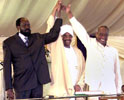
A Khartoum Monitor editorial last week pointedly titled “Where is the International Community?” is an expression of the mounting frustration over the lack of progress on the two referenda and the lack of international engagement to push the two Sudanese parties over the diplomatic stumbling blocks. Most recently over the weekend, Sudanese media was abuzz with rumors that the SPLM and NCP agreed to delay the referendum by six months when the proposition was raised only by one member of the referendum commission. Members of the SPLM quickly refuted the rumor, insisting that the vote will take place on time.
Preparations for the South Sudan and Abyei referenda are at a standstill largely because NCP cooperation has been sorely lacking on key issues. For one, Sudan’s ruling party continues to stall on signing off on the selection of a chairman for the Abyei Referendum Commission chairman, a decision that the ruling party had previously agreed would be the SPLM’s. (The NCP chose the South Sudan Referendum Commission’s chairman.) So far, the ruling party has rejected every candidate offered. The NCP has also demanded that border demarcation (that is, physically marking where borders are on the ground) be complete before a vote take place, despite the fact that demarcation has not been a prerequisite in other cases of secession and the logistical impossibility of such a task; the SPLM insist demarcation is not a precondition for the vote.
The two parties, the media, even the U.N., are caught up on peripheral issues that distract from the substantive preparations that urgently need to begin. One of the reasons cited for delaying the vote is because the commission’s secretary general has not been appointed. According to sources intimately familiar with the Referendum Law, the secretary general position is simply not that important. The secretary general’s authorities are as yet undefined and could well be negligible; the commission as it stands is fully capable of moving forward on referendum preparations without the “key” position.
It is in this frustrated atmosphere, with exactly five months left to go until the momentous vote, that Khartoum Monitor’s editors are lamenting the absence of international effort—especially those who committed to serving as guarantors of the Comprehensive Peace Agreement in 2005—to push the two parties forward:
Despite the disputes between the two partners, the international community is silent. Some of them are participating in the implementation of the CPA, but not enough as is expected if we compare their participation during the peace talks and the referendum now, there is a big difference. (…) They are supposed to play an active role to advise the two parties on what is going on.
So where is the international community? The U.N. and the A.U. have set up bi-monthly international consultative forums, meant to act as the main coordinating point between international stakeholders on various issues in Sudan, but it is unclear what coherent plan, if any, has emerged of the international diplomatic efforts that would be employed to ease obstacles like the one Sudan is faced with today. A recent workshop hosted by Egypt produced minimally positive results—in a joint statement both parties reiterated their commitment to holding the referendum on time.
The U.N. and the U.S. State Department have made uninspired statements calling for accelerated action, but never in a setting where Sudan is the only agenda item and rarely breaching diplomat-speak. (P.J. Crowley did explicitly call for cooperation from Khartoum at this State Department briefing, but only after he was drawn out by a reporter during the Q&A session. VOA published a U.S. government editorial conveying a similar message today.)
It seems that while international actors are conscious of the challenges the referenda are facing, their concern has not translated into the aggressive diplomatic engagement that the Khartoum Monitor is calling for. So much work remains before the two referenda can actually take place, but it’s a rare diplomat who is demanding that it start now.
Photo: Sudanese leaders Salva Kiir, Omar al-Bashir, and Ali Osman Taha in 2005 (AP)

